'Saving caged big cats was a race against time'
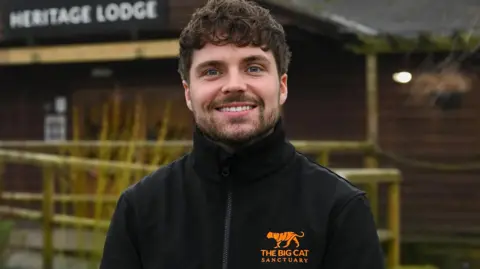 The Big Cat Sanctuary
The Big Cat SanctuaryWhen the director of a Hertfordshire trust was convicted of animal cruelty charges, a determined team faced a race against time to rescue the big cats left behind in its cages.
The 28 big cats held at the Cat Survival Trust in Welwyn were at risk of being put down when it closed, among them Eurasian lynxes, bobcats and rare Amur leopards.
The rescuers led by Cam Whitnall, of the Big Cat Sanctuary in Smarden, Kent, sprang into action - evacuating emaciated animals, nursing them back to health and seeing them safely rehomed.
"We stepped on board to try and evacuate all the cats because the fear was that they were all going to be euthanised if we couldn't get them off site in time," he said.
Terrence Moore, who ran the Cat Survival Trust, was banned from keeping animals for five years, and found guilty of four charges of causing unnecessary suffering to an animal.
"It was like a hoarder's paradise," said Mr Whitnall, who is star of CBBC's One Zoo Three.
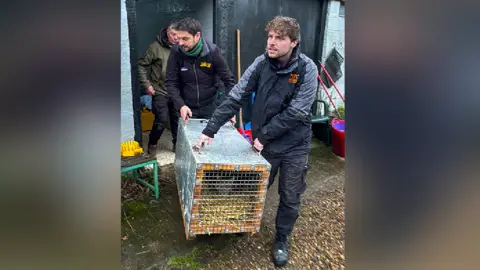 Big Cat Sanctuary
Big Cat SanctuaryMr Whitnall said he was alerted to conditions at the Cat Survival Trust by Matt Ford from Specialist Wildlife Services - and then worked with his mother Lynn, and brother Tyler at its sister site, Hertfordshire Zoo.
"We had an incredibly short space of time to act," he said
The 20-strong team worked every day for three months to feed and treat the cats and make the area safe.
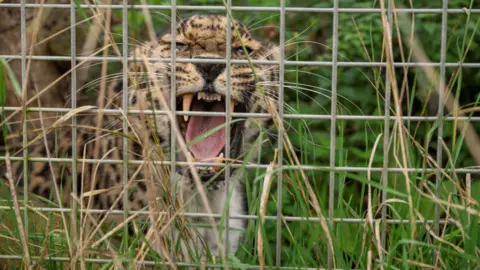 The Big Cat Sanctuary & Hertfordshire Zoo
The Big Cat Sanctuary & Hertfordshire ZooConditions at the trust were dangerous, he said, with discoloured drinking water.
"No animal deserved to be in those conditions, it was heart-breaking," he said.
"One of the lynxes was literally skin and bone and several were underweight - so our teams got on site and we sorted out their diet."
They worked with vets to coordinate health checks, carry out blood tests and put a plan into action to ensure the cats were strong enough to be moved on.
Comet, a rare Amur leopard, had to be euthanised, along with a jaguar called Jags, and Eurasian lynxes called Mrs Pudding and Sally - and a serval, Evie.
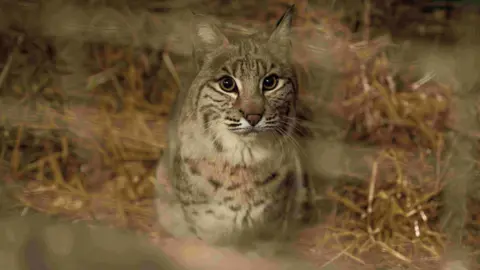 The Big Cat Sanctuary & Hertfordshire Zoo
The Big Cat Sanctuary & Hertfordshire ZooCollaborating with zoos, sanctuaries and private owners across the country, the team successfully found the remaining 23 big cats new homes.
"It was an urgent call to action to say, look, we need your help, here's a list of cats, can anyone support and take any of them on?" he said.
Mr Whitnall said his charity and Hertfordshire Zoo met the unexpected costs of the rescue, which ran into thousands of pounds.
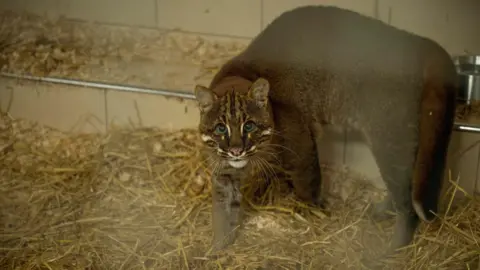 The Big Cat Sanctuary & Hertfordshire Zoo
The Big Cat Sanctuary & Hertfordshire ZooThe Big Cat Sanctuary in Kent is now home to three of the animals.
"We care for Frank who is Europe's only Asian golden cat, he's a lovely boy, he's got the most beautiful eyes," Mr Whitnall said.
"Boson, the fishing cat, has settled in really well, he's so confident now, he's always out - and little Rhys, the Eurasian lynx, he has his platform and he just likes to look out and people watch, so they're all doing really well.
"I wake up every day and I get to help animals, and I get to see them, it's beautiful, it's absolutely incredible.
"To see the neglect and the state in which they were in and being kept in, to now - having their forever homes - we're very happy."
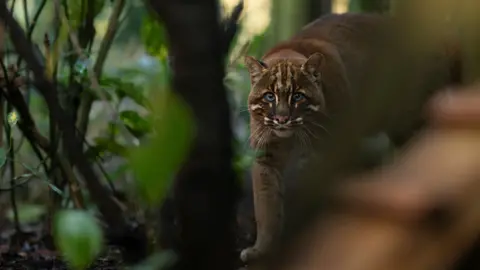 The Big Cat Sanctuary
The Big Cat SanctuaryIn total, eight pumas went to WildSide Exotic Rescue, along with lynxes Dumpling and Pudding, and bobcats Bob and Blob.
Servals Maggie and Michael are now at Wingham Wildlife Park in Kent, jungle cats Binx and Teddy now live at ARK Wildlife Park in Lincolnshire - and Churchill, also a serval, is thriving at Dartmoor Zoo in Devon.
Winston, another serval, is in a private collection, lynx Freddie is at Shepreth Wildlife Park in Cambridgeshire - and bobcat Bode is at Tropiquaria Zoo in Somerset.
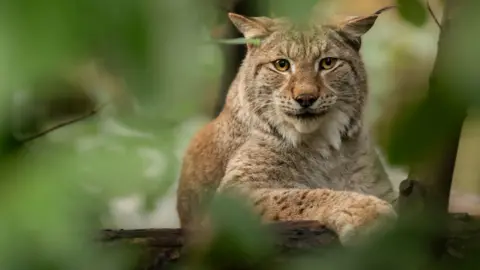 The Big Cat Sanctuary
The Big Cat SanctuaryMr Whitnall says he believes the rules and regulations on keeping animals need to change.
"It's 2025, this shouldn't still be happening, this continues to happen and nothing is improved upon," he said.
"Standards need improving across the board, protocols need to be better and licensing needs to be improved.
"There are too many places, not just in the UK but around the world, where people have the best intentions of wanting to care for animals, but they don't have the right facilities or experience or training.
"And unfortunately for those animals, they end up in poor situations and they're often neglected, injured or worse, they die.
"Anyone can just set up a sanctuary, it needs changing."
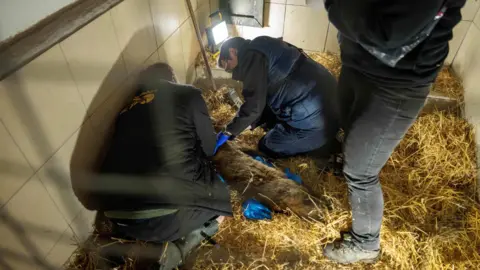 The Big Cat Sanctuary & Hertfordshire Zoo
The Big Cat Sanctuary & Hertfordshire ZooA spokesperson for the Department for Environment, Food and Rural Affairs said animal welfare legislation was in place to ensure high standards were maintained and enforced by local authorities, including the Animal Welfare Act and the Dangerous Wild Animals Act.
"Any establishment keeping or displaying animals must meet the necessary legal and licensing requirements," they said.
Vet Dave Martin, who provided an expert assessment on the welfare of the animals for the court case, said: "Seeing these animals thrive in a properly managed environment is incredibly rewarding.
"Their health has improved significantly, and they're now receiving the care they deserve."
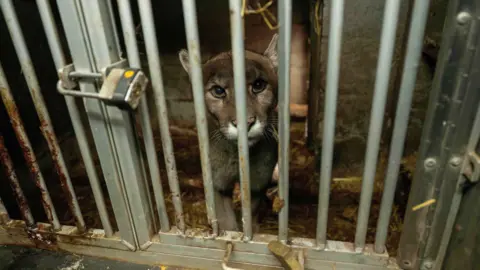 The Big Cat Sanctuary & Hertfordshire Zoo
The Big Cat Sanctuary & Hertfordshire ZooFollow Beds, Herts and Bucks news on BBC Sounds, Facebook, Instagram and X.
